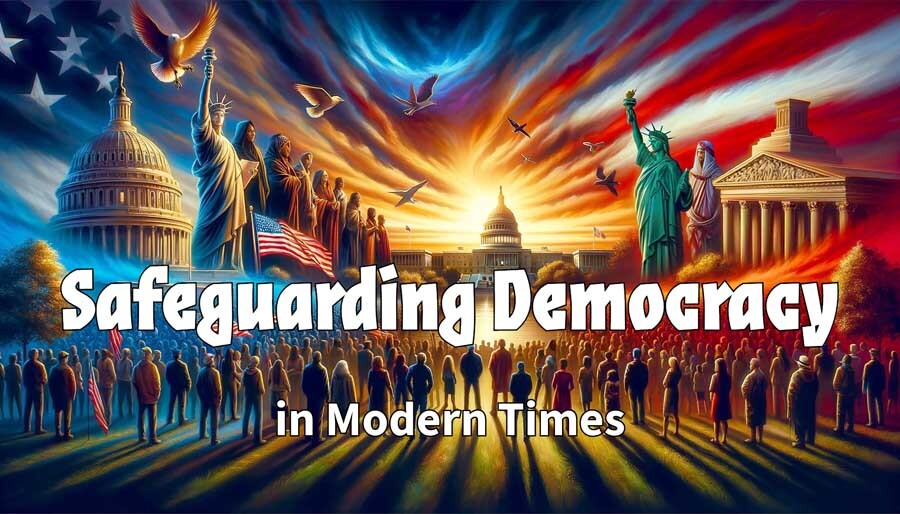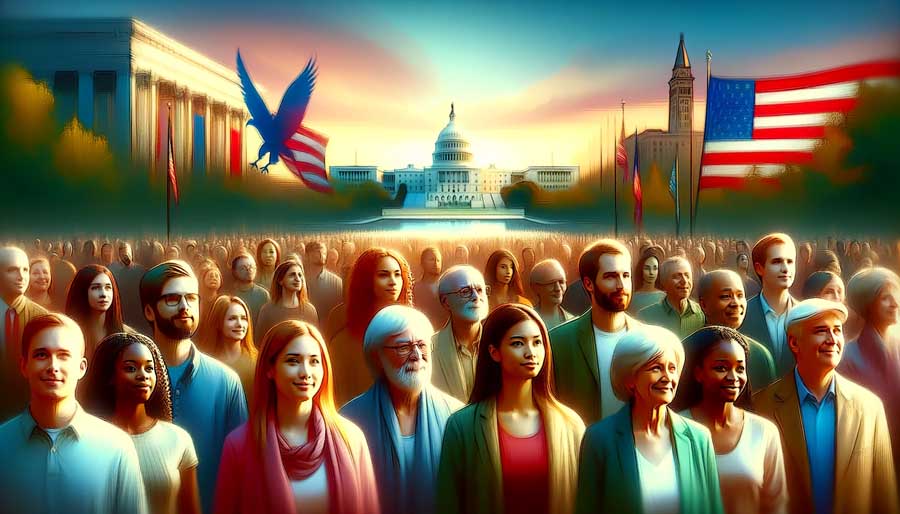
Posted by - News Staff![]() \
\
January 4, 2024 \
Filed in - Politics \
liberty justice and equality democracy authoritarianism Dictatorship \
2.2K views \ 0 reviews
JTFMax Politics/OP
In the tapestry of American democracy, woven with the threads of liberty, justice, and equality, the specter of authoritarianism often seems like a distant, incongruous figure. Yet, historical and contemporary events compel us to examine this figure more closely, questioning the resilience of our democratic institutions and our role in protecting them.
The Tripartite Balance: More Than a Historical Relic
At the heart of American democracy is the tripartite system of government, a structure enshrined in the Constitution to prevent the concentration of power. This system, dividing power among the executive, legislative, and judicial branches, is more than a mere relic from civics textbooks. It's a living, breathing mechanism to ensure no single branch usurps total control.
Consider a hypothetical scenario where the President, imbued with unrestrained power, begins to overshadow the other branches. In this scenario, the President might attempt to legislate unilaterally or manipulate the judiciary. However, the Constitution's checks and balances are a bulwark against overreach. Congress can override vetoes and impeach, while the judiciary can declare executive actions unconstitutional.
Presidential Powers: A Double-Edged Sword
The role of the U.S. President is often seen as one of immense power. However, these powers are not without limits. For instance, while the President can command the military, they cannot declare war without Congressional approval. This limitation is a crucial safeguard, ensuring that military power is not wielded arbitrarily.
The Trump era brought these issues into sharp focus. His presidency, marked by controversies and claims of overreach, raised critical questions about the extent of presidential authority and the effectiveness of existing checks.

From Divine Right to People's Might
Drawing parallels between modern U.S. governance and the divine right of medieval monarchs might seem far-fetched, yet it offers valuable insights. Unlike medieval rulers governed by divine decree, current leaders are bound by constitutional law. This shift from the religious right to the people's might is a testament to the progress in governance over the centuries.
The Sanctity of the Vote
The integrity of elections is the bedrock of democracy. Despite robust systems to ensure fair voting, the specter of electoral fraud and disenfranchisement looms large. The 2020 election, with its unprecedented challenges and aftermath, highlighted the importance of trust in electoral processes. Ensuring that every vote is counted and respected is not just a legal obligation but a moral imperative to uphold democracy.
Dictatorship in a Democratic Garb?
The idea of the U.S. morphing into a dictatorship might seem like a plot from a dystopian novel. Yet, it serves as a potent hypothetical to explore the robustness of American democracy. Such a transformation would necessitate a radical dismantling of the Constitution, a feat nearly impossible given the numerous checks and balances in place. This scenario, while far-fetched, underscores the importance of vigilance in protecting democratic values.
The Road Ahead: Vigilance and Participation
The future of democracy in the U.S. hinges on its citizens' active participation and vigilance. More is needed to cast a vote; engagement in the political process, staying informed, and holding leaders accountable are equally crucial. Imagine a society where citizens, empowered with knowledge and driven by civic duty, actively participate in shaping their government. Such a society is the most vigorous defense against the rise of authoritarianism.
The Role of the Individual: Guardians of Democracy
Each citizen plays a pivotal role in safeguarding democracy. Beyond voting, this includes engaging in peaceful activism, supporting democratic institutions, and advocating for transparency. In this digital age, where information and misinformation collide, educating oneself about civic responsibilities is more crucial than ever.
In conclusion, while the American democratic system is not impervious to challenges, its foundation is strong, bolstered by a vigilant and active citizenry. The lessons from history and the hypothetical future scenarios are reminders and guides. In the end, the preservation of democracy lies not in the hands of the few but in the collective will and action of the many.

Desert Local News is an invitation-only, members-based publication built on fact-checked, non-biased journalism.
All articles are publicly visible and free to read, but participation is reserved for members—comments and discussion require an invitation to join.
We cover local, state, and world news with clarity and context, free from political agendas, outrage, or misinformation.
Comments